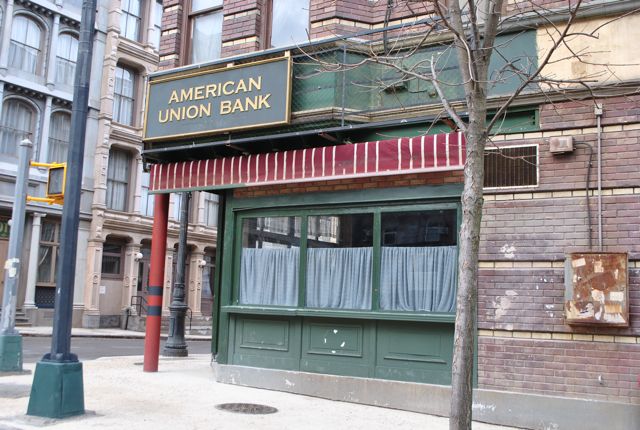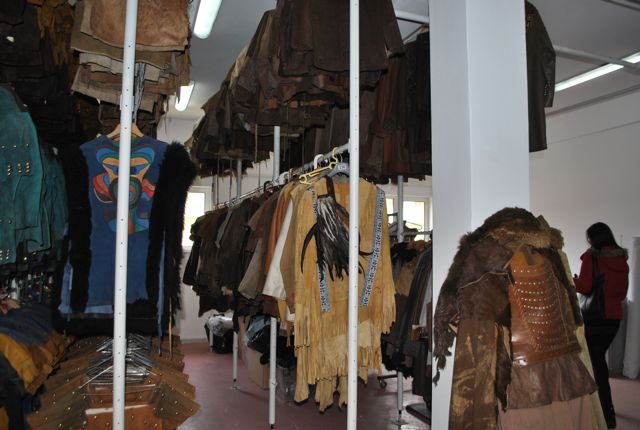Photos: the author
Polina Spartyanova
Passing through the small streets of New York you enter a tumble-down Arab neighbourhood and upon leaving it, you return a few ages back, finding yourself in the Roman Empire. This is just a small part of the film set of the largest film centre in Eastern Europe and the second largest in Europe, "Nu Boyana Film Studios", which is located in the outskirts of Sofia.
The film centre in Boyana began operating in 1962 as a state-owned company for feature film production called "Boyana Film Studios". Until the changes in 1989, the facility produced 20 feature films, 25 television films and 50 animated films a year and it had the reputation of the largest production house in the Balkans. Films like "Every Kilometre", "The Porcupine’s War", "Yesterday", "Time of Parting", "Asparukh" and many others are only part of the great productions of the film studios. During the transition in Bulgaria, the film industry declined as the state subsidy for film production was cancelled and the search for a solution to revive the film tradition in the country took many years. Successive Bulgarian governments attempted to recover and revive the activity, prestige and the role of the film studios relating to the culture of Bulgaria but were not able to restore the past glory of national film production.

In 2006, the former "Boyana Film Studios" were privatised and a California film company, "Nu Image", bought them from the Bulgarian government, despite the rumours that the new owner planned to demolish the studios and build a holiday village in their place. Actually, the company invested $50 million to renovate the abandoned complex in the outskirts of Sofia and to transform it into a modern film set, equipped with the latest state-of-the-art technology. Bulgaria’s nature, diverse landscape, architecture, seasons and natural phenomena are very suitable for the creation of every type of productions from the new owner of "Nu Boyana Film Studios ", which boldly invested in the development of the complex precisely for this reason. Another key factor that attracted the owner was the low labour costs in the country - nearly 10 times lower than in the U.S. and about three times lower than in the main rival countries in Europe, Romania and the Czech Republic.
"Nu Boyana Film Studios" has 13 fully-equipped studios with specially designed acoustics for filming, surrounded by 40,000 square metres of sets of various thematics for the filming of outdoor scenes. The wardrobe of the film giant has nearly 15,000 costumes that can dress both barbarians and princesses from long gone eras, and prisoners of labour camps.
-
Today, the majority of Bulgarian films and television series are filmed right here and receive a discount of 50% to 70% for the filming of the productions whereas foreign productions do not enjoy such privileges. However, over the past eight years, "Nu Boyana Film Studios" have hosted the filming of 180 feature films, including big-budget ones like "300 - The Rise of an Empire," "Olympus Has Fallen", "The Black Dahlia," "The Expendables I, II, III", "Conan" and many others. Due to the filming of some high-profile Hollywood productions stars like Arnold Schwarzenegger, Sylvester Stallone, Bruce Willis, Scarlett Johansson, John Travolta, Nicolas Cage, and many others have resided in Sofia.
In addition to contributing towards improving Bulgaria’s image in the world, "Nu Boyana Film Studios" has given the Bulgarian economy a significant impetus as only while filming "Expendables II" the film centre was able to put into it $20 million in three months. For this reason, the owners have recently requested the state to provide incentives for the film industry in Bulgaria, so that it can continue to grow and therefore give the economy ever-greater impetus but because of the political crisis in the country over the past year and a half, there are no such prospects, at least at present. Currently "Nu Boyana Film Studios" tries to attract European films, despite the strong competition in Europe, and it will film German, Italian and Russian productions by the end of the year.